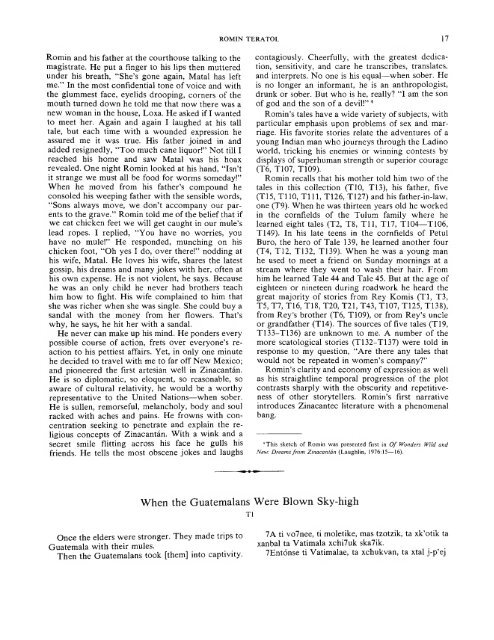PDF (Lo-Res) - Smithsonian Institution Libraries
PDF (Lo-Res) - Smithsonian Institution Libraries
PDF (Lo-Res) - Smithsonian Institution Libraries
Create successful ePaper yourself
Turn your PDF publications into a flip-book with our unique Google optimized e-Paper software.
Romin and his father at the courthouse talking to the<br />
magistrate. He put a finger to his lips then muttered<br />
under his breath, "She's gone again, Matal has left<br />
me." In the most confidential tone of voice and with<br />
the glummest face, eyelids drooping, corners of the<br />
mouth turned down he told me that now there was a<br />
new woman in the house, <strong>Lo</strong>xa. He asked if I wanted<br />
to meet her. Again and again I laughed at his tall<br />
tale, but each time with a wounded expression he<br />
assured me it was true. His father joined in and<br />
added resignedly, "Too much cane liquor!" Not till I<br />
reached his home and saw Matal was his hoax<br />
revealed. One night Romin looked at his hand, "Isn't<br />
it strange we must all be food for worms someday!"<br />
When he moved from his father's compound he<br />
consoled his weeping father with the sensible words,<br />
"Sons always move, we don't accompany our parents<br />
to the grave." Romin told me of the belief that if<br />
we eat chicken feet we will get caught in our mule's<br />
lead ropes. I replied, "You have no worries, you<br />
have no mule!" He responded, munching on his<br />
chicken foot, "Oh yes I do, over there!" nodding at<br />
his wife, Matal. He loves his wife, shares the latest<br />
gossip, his dreams and many jokes with her, often at<br />
his own expense. He is not violent, he says. Because<br />
he was an only child he never had brothers teach<br />
him how to fight. His wife complained to him that<br />
she was richer when she was single. She could buy a<br />
sandal with the money from her flowers. That's<br />
why, he says, he hit her with a sandal.<br />
He never can make up his mind. He ponders every<br />
possible course of action, frets over everyone's reaction<br />
to his pettiest affairs. Yet, in only one minute<br />
he decided to travel with me to far off New Mexico;<br />
and pioneered the first artesian well in Zinacantan.<br />
He is so diplomatic, so eloquent, so reasonable, so<br />
aware of cultural relativity, he would be a worthy<br />
representative to the United Nations—when sober.<br />
He is sullen, remorseful, melancholy, body and soul<br />
racked with aches and pains. He frowns with concentration<br />
seeking to penetrate and explain the religious<br />
concepts of Zinacantan. With a wink and a<br />
secret smile flitting across his face he gulls his<br />
friends. He tells the most obscene jokes and laughs<br />
ROMIN TERATOL 17<br />
contagiously. Cheerfully, with the greatest dedication,<br />
sensitivity, and care he transcribes, translates,<br />
and interprets. No one is his equal—when sober. He<br />
is no longer an informant, he is an anthropologist,<br />
drunk or sober. But who is he, really? "I am the son<br />
of god and the son of a devil!" 4<br />
Romin's tales have a wide variety of subjects, with<br />
particular emphasis upon problems of sex and marriage.<br />
His favorite stories relate the adventures of a<br />
young Indian man who journeys through the Ladino<br />
world, tricking his enemies or winning contests by<br />
displays of superhuman strength or superior courage<br />
(T6, T107, T109).<br />
Romin recalls that his mother told him two of the<br />
tales in this collection (T10, T13), his father, five<br />
(T15, T110, Till, T126, T127) and his father-in-law,<br />
one (T9). When he was thirteen years old he worked<br />
in the cornfields of the Tulum family where he<br />
learned eight tales (T2, T8, Til, T17, T104—T106,<br />
T149). In his late teens in the cornfields of Petul<br />
Buro, the hero of Tale 139, he learned another four<br />
(T4, T12, T132, T139). When he was a young man<br />
he used to meet a friend on Sunday mornings at a<br />
stream where they went to wash their hair. From<br />
him he learned Tale 44 and Tale 45. But at the age of<br />
eighteen or nineteen during roadwork he heard the<br />
great majority of stories from Rey Komis (Tl, T3,<br />
T5, T7, T16, T18, T20, T21, T43, T107, T125, T138),<br />
from Rey's brother (T6, T109), or from Rey's uncle<br />
or grandfather (T14). The sources of five tales (T19,<br />
T133-T136) are unknown to me. A number of the<br />
more scatological stories (T132-T137) were told in<br />
response to my question, "Are there any tales that<br />
would not be repeated in women's company?"<br />
Romin's clarity and economy of expression as well<br />
as his straightline temporal progression of the plot<br />
contrasts sharply with the obscurity and repetitiveness<br />
of other storytellers. Romin's first narrative<br />
introduces Zinacantec literature with a phenomenal<br />
bang.<br />
"This sketch of Romin was presented first in Of Wonders Wild and<br />
New: Dreams from Zinacantan (Laughlin, 1976:15—16).<br />
When the Guatemalans Were Blown Sky-high<br />
Tl<br />
Once the elders were stronger. They made trips to<br />
Guatemala with their mules.<br />
Then the Guatemalans took [them] into captivity.<br />
7A ti vo7nee, ti moletike, mas tzotzik, ta xk'otik ta<br />
xanbal ta Vatimala xchi7uk ska7ik.<br />
7Entonse ti Vatimalae, ta xchukvan, ta xtal j-p'ej

















